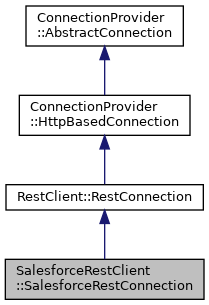 |
Qore SalesforceRestClient Module Reference
1.4
|
 |
Qore SalesforceRestClient Module Reference
1.4
|
class for Salesforce.com REST connections; returns SalesforceRestClient::SalesforceRestClient objects More...

Public Member Methods | |
| deprecated | constructor (string name, string desc, string url, bool monitor, *hash opts, hash urlh) |
| DEPRECATED: creates the SalesforceRestConnection object. More... | |
| constructor (string name, string description, string url, hash< auto > attributes={}, hash< auto > options={}) | |
| creates the SalesforceRestConnection connection object More... | |
| DataProvider::AbstractDataProvider | getDataProvider () |
| returns a data provider object for this connection More... | |
| *hash< auto > | getDefaultOptions () |
| returns default options | |
| hash< auto > | getOptions () |
| gets options More... | |
| string | getType () |
returns "rest" | |
| bool | hasDataProvider () |
| returns True as this connection returns a data provider with the getDataProvider() method More... | |
Static Public Member Methods | |
| static deprecated SalesforceRestConnection | make (string name, string desc, string url, bool monitor, *hash opts, hash urlh) |
| DEPRECATED: static constructor. More... | |
Public Attributes | |
| const | Options |
| SalesforceRestConnection object connection options. | |
Private Member Methods | |
| SalesforceRestClient | getImpl (bool connect=True, *hash< auto > rtopts) |
| returns a SalesforceRestClient::SalesforceRestClient object More... | |
class for Salesforce.com REST connections; returns SalesforceRestClient::SalesforceRestClient objects
supports the following options:
"api": the Salesforce.com API to use; use "auto" (the default) to use the latest API version"client_id": (required) the Salesforce.com "consumer key" for the Connected App"client_secret": (required) the Salesforce.com "consumer secret" for the Connected App"connect_timeout": connection timeout to use in milliseconds"content_encoding": this sets the send encoding (if the "send_encoding" option is not set) and the requested response encoding; for possible values, see EncodingSupport"data": see DataSerializationOptions for possible values; the default is "auto" for possible values; note that it's recommended to use "yaml" when talking to Qorus"error_passthru": if True then HTTP status codes indicating errors will not cause a REST-RESPONSE-ERROR exception to be raised, rather such responses will be passed through to the caller like any other response"http_version": HTTP version to use ("1.0" or "1.1", defaults to "1.1")"max_redirects": maximum redirects to support"proxy": proxy URL to use"redirect_passthru": if True then redirect responses will be passed to the caller instead of processed"send_encoding": a send data encoding option or the value "auto" which means to use automatic encoding; if not present defaults to no content-encoding on sent message bodies"timeout": transfer timeout to use in milliseconds| deprecated SalesforceRestClient::SalesforceRestConnection::constructor | ( | string | name, |
| string | desc, | ||
| string | url, | ||
| bool | monitor, | ||
| *hash | opts, | ||
| hash | urlh | ||
| ) |
DEPRECATED: creates the SalesforceRestConnection object.
| name | the name of the connection |
| desc | connection description |
| url | connection URL (potentially with password info) |
| monitor | monitoring flag |
| opts | connection options |
| urlh | broken down URL hash (as returned by Qore::parse_url()) |
| SalesforceRestClient::SalesforceRestConnection::constructor | ( | string | name, |
| string | description, | ||
| string | url, | ||
| hash< auto > | attributes = {}, |
||
| hash< auto > | options = {} |
||
| ) |
creates the SalesforceRestConnection connection object
| name | the name of the connection |
| description | connection description |
| url | connection URL (potentially with password info) |
| attributes | various attributes. See below |
| options | connection options |
See AbstractConnection::constructor() for attributes and options reference.
| DataProvider::AbstractDataProvider SalesforceRestClient::SalesforceRestConnection::getDataProvider | ( | ) |
returns a data provider object for this connection
| DATA-PROVIDER-ERROR | this object does not support the data provider API |
|
privatevirtual |
returns a SalesforceRestClient::SalesforceRestClient object
| connect | if True, then the connection is returned already connected |
| rtopts | this connection type does not accept any runtime options, so this parameter is ignored |
Reimplemented from RestClient::RestConnection.
| hash<auto> SalesforceRestClient::SalesforceRestConnection::getOptions | ( | ) |
gets options
"api": the Salesforce.com API to use; use "auto" (the default) to use the latest API version"client_id": (required) the Salesforce.com "consumer key" for the Connected App"client_secret": (required) the Salesforce.com "consumer secret" for the Connected App"connect_timeout": connection timeout to use in milliseconds"content_encoding": this sets the send encoding (if the "send_encoding" option is not set) and the requested response encoding; for possible values, see EncodingSupport"data": see RestClient::RestClient::DataSerializationOptions for possible values; the default is "auto" for possible values; note that it's recommended to use "yaml" when talking to Qorus"error_passthru": if True then HTTP status codes indicating errors will not cause a REST-RESPONSE-ERROR exception to be raised, rather such responses will be passed through to the caller like any other response"http_version": HTTP version to use ("1.0" or "1.1", defaults to "1.1")"max_redirects": maximum redirects to support"proxy": proxy URL to use"redirect_passthru": if True then redirect responses will be passed to the caller instead of processed"send_encoding": a send data encoding option or the value "auto" which means to use automatic encoding; if not present defaults to no content-encoding on sent message bodies"timeout": transfer timeout to use in milliseconds| bool SalesforceRestClient::SalesforceRestConnection::hasDataProvider | ( | ) |
returns True as this connection returns a data provider with the getDataProvider() method
|
static |
DEPRECATED: static constructor.